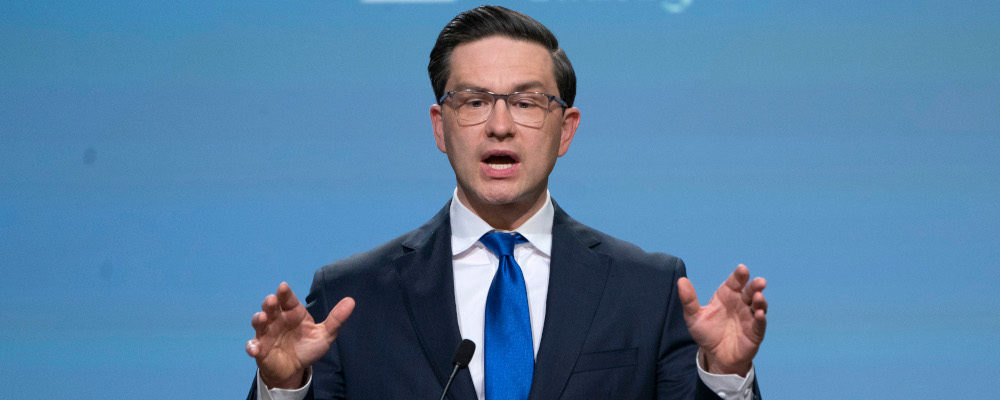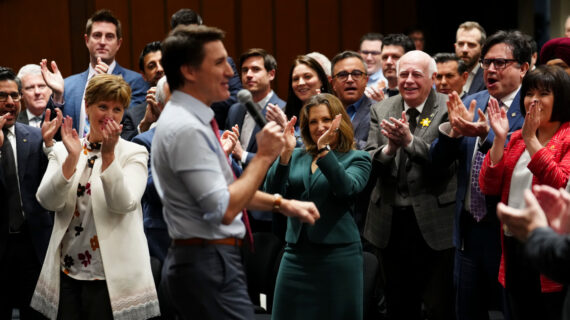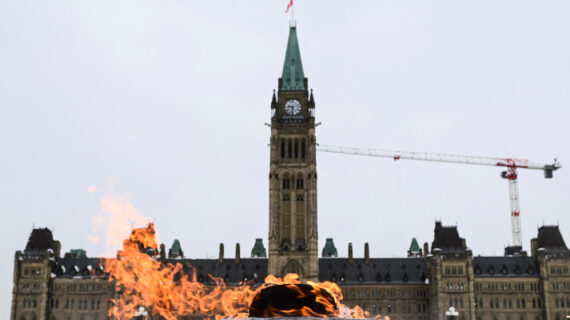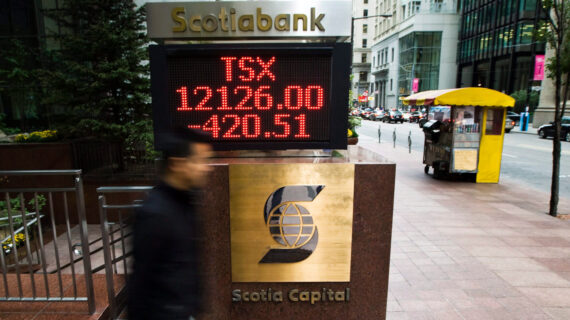Pierre Poilievre has been compared to every current right-wing populist figure under the sun, from Donald Trump to Boris Johnson to Marine Le Pen. And it’s not unfair to call Poilievre a populist—if anything it’s probably a label he’d happily wear if you asked him. His attacks on the “gatekeepers” are a textbook example of populist rhetoric.1Going after Canada’s elite gatekeepers could be a winning strategy for the next Conservative leader https://thehub.ca/2022-02-21/going-after-canadas-elite-gatekeepers-could-be-a-winning-strategy-for-the-next-conservative-leader/ Poilievre is still the clear favourite to win the Conservative leadership, and his ascendancy will represent something of a populist shift in the federal Conservatives.
But if populism is about at least ostensibly challenging governing orthodoxies and dogmas, then what’s remarkable is how little challenge there actually is to the many third rails and off-limit topics of Canadian politics. More fundamentally, Canada’s various populist bubblings and challengers are all offering different varieties and flavours of small-l liberalism. Their challenges to Canadian orthodoxies are liberal challenges; there really aren’t any radical challenges that deviate from the hegemonic liberalism that dominates virtually all Canadian politics outside of Quebec.
Poilievre’s message and vision seem to be at their core a sort of idiosyncratic libertarian populism. He talks about wanting to make Canada the freest country in the world and wants to help people “take back control of their lives.” His campaign is increasingly dominated by attacks on the Bank of Canada, which can be seen as a populist attack on an elite institution. But what’s interesting about his criticisms of the Bank is that it’s not a populist “the people should control money” argument, which is often what you hear from anti-neoliberal populists in Europe.
Though, it must be conceded, that allowing people to take back control of their money is how Poilievre has defended his promotion and enthusiasm for cryptocurrencies. Instead, he’s arguing that the Bank has not behaved independently enough and that he wants to restore its independence. Whether or not you buy his criticisms of the bank and its behaviour during the pandemic, the point is that while this might be a populist attack on the bank, it isn’t a fundamentally anti-liberal one.
He may be attacking the independence of the bank, but, at least on his account of what he’s doing, he’s not attacking the notion of an independent bank. Rather, he thinks he’s trying to restore it. In practice, what Poilievre seems to be offering is liberalism, albeit a different flavour of it—he doesn’t seem intent on challenging Canada’s liberal consensus in any meaningful way.
Take for example the great third rail of Canadian politics: immigration. The rise of populism around the world in recent years has many competing explanations, but a backlash against immigration is a common theme in many of the places where populism has caused political earthquakes. Poilievre, nor any major candidate in the race, has shown absolutely no interest in touching this. If anything, he has embraced the political consensus on immigration, making direct pitches and appeals to immigrant communities. This is probably a political necessity given the diversity of ridings in areas like Toronto that anyone who seeks to form government will need to win.
But the present moment might well be ripe for a populist challenge to this consensus. Over 400,000 immigrants came to Canada in 2021, a record number.2Immigration and ethnocultural diversity statistics https://www.statcan.gc.ca/en/subjects-start/immigration_and_ethnocultural_diversity Yet with a growing number of younger Canadians locked out of the housing market due to skyrocketing prices, it’s a surprise a political entrepreneur hasn’t come along and pointed out, rightly or wrongly, that Canada’s high levels of immigration are likely to keep propping up what feels like to many young Canadians an economic pyramid scheme in which they pay exorbitant amounts for housing so that older Canadians can retire.3The one factor in the housing bubble that our leaders won’t talk about https://thehub.ca/2021-07-23/howard-anglin-the-one-factor-in-the-housing-bubble-that-our-leaders-wont-talk-about/ While the PPC have made such arguments, and while you will see this kind of sentiment bubble up on social media, it’s probably more widespread than we generally assume. Thus far no serious figure has challenged the status quo on this.
Arguments in favour of immigration are often framed in economic terms. We need these immigrants to keep our population growing and to support an ageing society. But of course, there’s no real challenge or consideration given to the deeper reasons why this is necessary, namely that we need high levels of immigration because of our low, and still falling, birth rates.4Fertility rate, total (births per woman) – Canada https://data.worldbank.org/indicator/SP.DYN.TFRT.IN?locations=CA Our discourse and politics just accept this as a fact, given that having children is just entirely a personal choice. To suggest that we should try and increase birth rates and that having children and starting families are a social good we actively ought to be promoting and encouraging seems beyond the pale. Bring this up, and you’ll inevitably get accused of being a secret white supremacist who is motivated by racial concerns. For many pundits and elites, it is simply inconceivable that anyone could be legitimately concerned about birth rates and thus must have ulterior motives.
Even the ways we talk about childcare, focused on things like workforce participation, generally exclude the radical possibility that perhaps having parents stay home with children might actually be a good thing. Interesting writers and thinkers challenge this on the margins, and some interesting family policy is sometimes proposed, but nothing radical enough to actively and directly make the case for more babies and families, or for making it easier for people to raise families on single incomes, is ever really considered or taken seriously. We are incapable of thinking about any of these things outside of the liberal language of choice.
And if you want a really clear example of the dominance of liberalism in Canada and the hegemony of basic liberal ideas like freedom and individual rights, look no further than the recent Ottawa trucker protest and the broader anti-lockdown/mandate movement. There were undoubtedly fringe and conspiratorial elements that wove their way into this movement. But to suggest that what really motivated most of the people opposed to vaccine mandates and lockdown restrictions were conspiracy theories or, as some academics and pundits have tried to suggest, that cries for freedom were really just a veiled form of white supremacy, is asinine. As George Orwell said, “there are some ideas so absurd that only an intellectual could believe them.” The rallying cries for these protests and movements were freedom and liberty. Their populism and rejection of the elite consensus is a fundamentally liberal rejection of what is perceived by these populists as an anti-liberal restriction of basic rights.
Freedom is a contested idea. People have different understandings of what freedom means and how far it should extend, and these are reasonable disagreements. You can disagree with the freedom convoy, the blockades, and the various anti-lockdown and mandate movements, but even their rambunctious populism was mostly a disagreement within the liberal tent. These people were not set on some sort of illiberal fascism, as some suggested. Their complaints were precisely that freedom and liberty weren’t being taken seriously enough.
Even the Charter itself, the great symbol of modern Canadian liberalism, has undergone something of a transformation in the eyes of many would-be populists.5The Charter at Forty: How the Charter has shaped society since 1982 https://thehub.ca/2022-04-18/charter-at-forty-how-canadas-charter-has-shaped-society-since-1982/ Thirty years ago, opposition to the Charter as a danger to Canada’s parliamentary system of government was a fairly widespread conservative belief. But during the pandemic what has really been clear is that the Charter is no longer opposed, if at all, because it constitutionally entrenches individual rights. Instead, criticism of the Charter is that it doesn’t fully protect individual rights, that courts and the “reasonable limits” clause mean that government violations of individual rights are upheld far too frequently. The populists and right more broadly no longer reject the Charter because of its liberalism—they criticise it for not being liberal enough.
The only place in Canada where liberalism really is challenged, and where there are alternative ways of thinking about political life, is Quebec. Quebec’s language laws and approach to secularism are undoubtedly at odds with the settled liberalism of the rest of Canada. They emphasize different understandings of rights and political values beyond the individual and autonomy-based liberalism of English Canada.
This is nothing new of course. Implicit in the bargain of the Canadian Confederation has been a recognition that Quebec’s distinctiveness meant it was going to do things that might sit uncomfortably with other parts of Canada. Quebec’s non-liberal approach to issues of language and culture still receives plenty of criticism outside of Quebec, but in rejecting the liberalism of English Canada, Quebec is an outlier within the country and not a harbinger of future developments elsewhere. And even then, on issues like abortion and euthanasia, Quebec has even more aggressively liberal views than the rest of Canada. Its rejection of English liberalism is limited and relatively focused on questions of cultural distinctiveness.
The point here is not to argue for a political figure who attacks the various third rails outlined above. The point is that whilst Canada might seem to be in a moment of political upheaval, the country’s narrow liberal consensus remains as strong as ever. Even opposition to Canada’s consensus tends to be a fundamentally liberal opposition. It tends to emphasize different understandings of freedom or autonomy. It attacks the liberal consensus in Canada as not being liberal enough and offers a different flavour of liberalism instead. Canada undoubtedly faces some political tumult and populist challenges, but nothing on offer challenges Canada’s hegemonic liberal consensus. At most these challengers seek to tinker at the technocratic edges of the consensus.
Whilst bloviating about the dangers of populism is a popular pundit pastime, populism has a long and storied tradition in Canada. Two of the three major parties at the federal level today, the NDP and the Conservatives, trace their origins to precursor populist parties in the CCF and the Reform Party respectively. The now-defunct social credit movement was a kind of agrarian populism obsessed with monetary policy and banking. Yet surveying the contemporary landscape, it’s not clear what the populists du jour actually challenge in a meaningful way. Yes, they want to stick a finger in the eye of a complacent elite and do seek change, but the alternatives they offer are simply different flavours of liberalism.
Political rhetoric and fearmongering try to make us think that there are radical differences between the various political options on offer to Canadians across the country and across the political spectrum, but the reality is that Canadian politics is stuck in a smug and complacent mediocrity where the differences between our major parties are relatively small. What the current batch of populists are most likely to offer is a satisfying finger in the eyes of our insular and mediocre elites. And whilst they might be able to change a few marginal things, and also potentially help further erode confidence in our public institutions, they won’t fundamentally challenge the Canadian consensus.
Canada actually does need something of a shakeup to wake us from this stupor and to address the growing challenges this country faces. The current batch of populists on offer aren’t the people to do that, and Canada’s narrow Laurentian liberal consensus remains strong.




